Teachers’ views on ‘food’ animals for sustainability education: an exploratory study
IF 3.1
3区 教育学
Q1 EDUCATION & EDUCATIONAL RESEARCH
引用次数: 0
Abstract
Abstract Sustainability education is crucial in helping students deal with current health and environmental challenges through dietary choices. This study aims to provide an understanding of how the teachers surveyed (n = 416, 85% women; 58% teaching natural sciences) view the importance of the following interrelated issues for sustainability: (1) the viability of diets for tackling environmental challenges and natural resource management; (2) the health benefits of traditional versus plant-based diets; and (3) the impacts of factory farming on animals and animal sentience. Most participants recognised the importance of a sustainable education model that encourages reducing meat consumption while adopting healthy plant-based diets. Furthermore, the majority recognise animal sentience and agree that schools should address the negative impacts of factory farming on animals and the environment. The results are striking, as they indicate that most teachers’ views contrast with the traditionalist and instrumental portrayal of animals in national core curricula.可持续发展教育中教师对“食物”动物的看法:一项探索性研究
本文章由计算机程序翻译,如有差异,请以英文原文为准。
求助全文
约1分钟内获得全文
求助全文

 求助内容:
求助内容: 应助结果提醒方式:
应助结果提醒方式:


